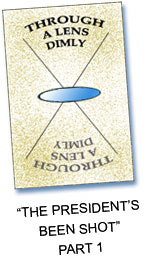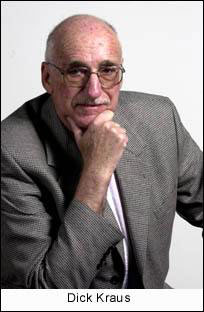"THE
PRESIDENT'S BEEN SHOT"
PART I
THE
ASSASSINATION
by
Dick Kraus
Newsday
Staff Photographer (retired)
It was my day off and I don't know why I didn't have my car radio
on that day; I just didn't. So I didn't hear the news until I
returned
home from a food shopping trip with my wife, and answered
the phone. It was
the Day Photo Editor. I could sense the urgency in his voice. He
all but shouted, "Where
have you been? The President's been shot and
he is not expected to live. We need you to work, today."
It took a few minutes for his words to register, but I
quickly
changed clothes and did as he had instructed. I lived
about 20 miles from
the paper and he told me to head in that direction and
photograph anything
that I saw that would tell the story of that terrible
day. I stopped at
several churches and synagogues to see if there were
any prayer services,
but, it was too soon and none were in progress. I looked
for groups of
people gathered on corners or maybe watching the news
unfold on tv sets in
store windows, but that wasn't happening. The only sense
that I had that
something was amiss was when I stopped for traffic lights
in the downtowns
of the communities through which I was passing. I could
see other drivers,
waiting at the lights, hunched forward; faces grim, obviously
listening to
the news on their car radios. But, this didn't make a
picture, either.
Since we had no mobile phones, car radios or beepers
in 1963, I was
told to phone in often. But every time I called from
public phones, I
would get busy signals, even before I finished dialing.
I would have to
call the Operator and explain that I was a journalist,
and then she would
connect me with the paper.
After getting a few shots, of whatever I could find,
the desk told
me to bring it in. When I got back to my newspaper I couldn't believe
the pandemonium that I found when I walked through our newsroom.
People were running around shouting. People were throwing
crumpled copy paper in the air. Editors
were screaming for the latest wire copy and the paper
on the floor was
ankle deep. One news editor just sat at his desk,
staring blankly into
space and chewing the ends of pencils down to stubs,
one after another.
When I got to the Photo Dept., the Director of Photography
was
there.
"Give
your film to a darkroom tech. You, Ike and Cavanaugh are
booked on a flight to Washington. Kennedy is dead.
Your plane leaves from
Laguardia Airport
in an hour. Someone will
drive you guys there. Here's the plan. Cavanaugh
will shoot a few quick
rolls of whatever presents itself at the airport
and grab the next flight
back to NY. Ike will head to the center of Washington
and spend an hour
getting the mood there and head back to NY. You
are to go to Bethesda Naval
Hospital, and hopefully get something of the
President's body being brought
there. And, if you can, maybe something of Jackie.
Then get back to
Washington and hand your film off to Ike, who
will bring it back here. You
stay in Washington for the next few days and
get what you can."
The three of us got to the airport in record
time, and just got on
our flight before the door shut and we taxied
onto the runway. And there
we sat for the next two hours. Eventually,
the Captain made an announcement
to the effect that our flight was being held
for a VIP who was coming in
from Canada and was to connect with our flight
to Washington. The three of
us wondered what the people back at the paper
and our Bureau Chief in
Washington would think when we failed to show
up for our tightly
choreographed coverage. There was no way that
we could inform them of the
delay, so we sat back and enjoyed the free
drinks that the flight attendants
offered to take the sting out of our delay.
After two hours, our flight was released without
our ever knowing who
the mystery VIP was.
Cavanaugh left us to do his thing as soon
as we landed. Ike and I grabbed a
cab and headed for our bureau office in the
National Press Building to see
what our Bureau Chief wanted to do. The place
was dark and deserted by the
time we got there. It was after 10 PM. I expected
the scene there to be more
of an asylum than our home office was, given
that this was now the center
of the World's attention. But, Bob Rhodes,
our Bureau Chief was alone in
his office, reading copy when we walked in.
He took his feet off the desk
and gestured us towards chairs. He reached
into a desk drawer and retrieved
a bottle of Johnny Walker Red and some paper
cups and poured us each a
short drink.
"I'm sure that you have good reasons for your being delayed and there's
no sense wasting time going over it. Let's see what we can salvage. Dick,
you head out to Bethesda and see if there's anything to be made. I'm sure
that the President's body has already been brought in, but see if you can
get any of the mood of the place. Ike, you walk around town, here, and see
what you can make and then we'll get you Dick's film and you can head
back."
I couldn't believe how calm and rational this man was behaving,
compared to what I had seen back on Long Island. I grabbed a
cab to
Bethesda Naval Hospital only to find out that no news people
were being
allowed on the grounds. So, I phoned the news back to the bureau
and Bob
Rhodes let Ike head for NY. I shot a few frames of the hospital
through the
fence and headed back to the bureau.
Bob listened sympathetically to my recounting of the day's woes,
poured me another scotch and we planned our coverage for the
next day. That
would be Saturday, Nov. 23rd. In those days we had no Sunday
paper and
because of that, Bob didn't see any sense of urgency for coverage
that day,
since by Monday it would be two day old news. But, he suggested
that I
sleep late, and at some time during the day, head over to the
White House
and get pictures of the dignitaries arriving to pay condolence
calls.
END
OF PART I
Dick Kraus
newspix@optonline.net
http://www.newsday.com
|

